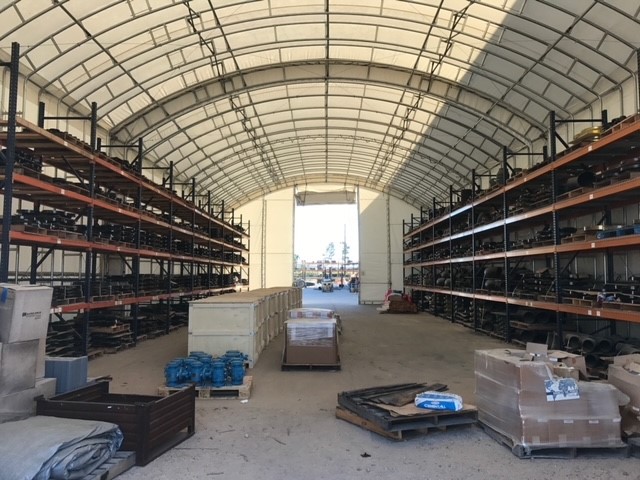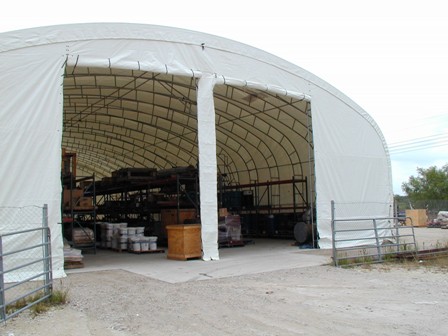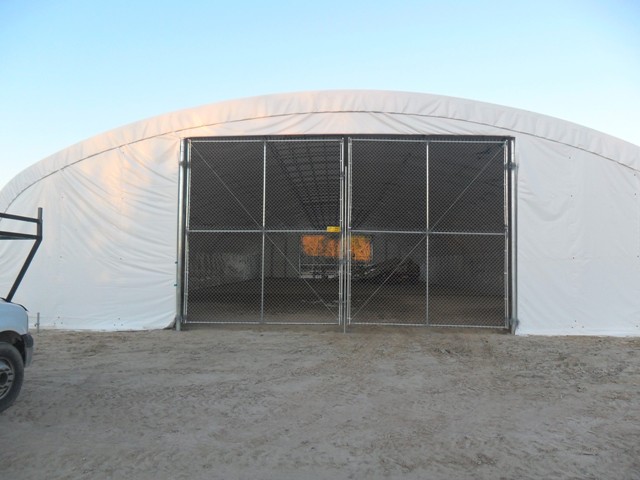Industrial Warehouse Tents: Maximize Space while Minimizing Cost.

The modern industrial landscape is characterized by rapid growth, innovation, and an ever-increasing demand for operational efficiency. One of the most pressing challenges faced by businesses today is finding cost-effective and flexible storage solutions. Traditional warehouses, while useful, often come with high construction and maintenance costs, and they lack the versatility that many industries require. This is where temporary warehouses come into play, providing a practical and efficient solution to these challenges.
The Growing Need for Warehouse Space in Industries
Space is an invaluable asset in industries. It's needed for storing raw materials, equipment, excess inventory of finished goods, and sometimes, even for processing operations. As businesses grow, so does their need for space. However, finding additional space isn't always straightforward. Expanding current facilities or building new ones can be a time-consuming, costly process, often requiring planning permissions and construction work that can disrupt regular operations.
Moreover, the need for space in industries is not always constant. Seasonal fluctuations, special projects, and market demands can create temporary needs for extra space. These variable demands make it challenging to decide whether investing in permanent structures is the most cost-effective solution.
In essence, many businesses are stuck between a rock and a hard place: they need more space, but the cost, time, and inflexibility of traditional warehousing solutions often make them impractical. This is where the concept of industrial warehouse tents comes into the picture as a game-changer, offering an innovative solution to these challenges.

The Versatility of Industrial Warehouse Tents
Industrial warehouse tents are versatile fabric structures designed to meet the dynamic and diverse needs of various industries. These tents are not the typical tents you might imagine – they are robust, durable, and engineered to withstand the rigors of industrial use. Made from high-quality materials, these tents can weather harsh conditions, providing a reliable and secure storage solution.
The key feature of industrial warehouse tents lies in their flexibility and adaptability. They come in a variety of sizes and can be customized to fit specific requirements, accommodating everything from standard storage needs to specialized industrial operations. Whether you need extra height for large machinery, specific temperature conditions for sensitive material, or simply additional space for regular inventory, an industrial warehouse tent can be designed to meet those needs.
Setting up these tents is relatively quick and straightforward, especially when compared to the construction times of traditional warehouses. This quick setup time means businesses can respond swiftly to increasing space demands, minimizing disruption to operations.
Moreover, these tents are portable. If your business operations move or expand, the tent structure can be disassembled and reassembled at the new location, eliminating the need for new construction. This portability also makes these tents an excellent solution for businesses that need temporary storage space during peak seasons or for special projects.
Industrial warehouse tents provide a practical, flexible, and efficient solution to the space challenges that many businesses face. They bridge the gap between the need for extra space and the constraints associated with traditional warehousing solutions, offering an alternative that is both space-efficient and cost-effective.
Benefits of Industrial Warehouse Tents
- Lower Initial Investment: The initial investment in an industrial tent is significantly lower than that of constructing a traditional warehouse structure. Construction of a traditional warehouse involves substantial costs related to materials, labor, and often, complex building permits. Industrial warehouse tents, on the other hand, are quicker and simpler to set up, leading to lower labor costs and potentially avoiding the need for an expensive building permit.
- Lower Maintenance: The ongoing maintenance costs of these tents are generally lower. Traditional warehouses, with their more complex structures, often require substantial upkeep, including structural repairs, regular maintenance and other hidden costs. Industrial warehouse tents are designed to be robust and durable with less need for ongoing maintenance, further reducing their total cost of ownership.
- Temporary Warehouse Structure: One of the most appealing features of industrial warehouse tents is their mobility. These storage tents can be disassembled, moved, and reassembled at a new location. This makes them an ideal solution for businesses with changing locations, like construction sites, or for companies looking to expand their operations without investing in new permanent structures.
- Maximize Capacity: The clear span structure along with the ability to adjust the size and layout of the shelter structure means you only pay for the space you need. This is especially beneficial for businesses with fluctuating space demands, as they can avoid the cost of maintaining unutilized space during off-peak periods.
- Quick Setup: Industrial warehouse tents can be set up quickly, often in a matter of days, compared to the weeks or months it can take to construct traditional warehouses. This allows businesses to respond swiftly to changing storage needs, minimizing disruption to operations.
- Environmentally Friendly: Industrial warehouse tents can be more environmentally friendly than traditional warehouses. Their temporary nature and portability reduce the need for permanent construction, thus saving on materials. Additionally, certain tents are designed to utilize natural light, reducing the need for artificial lighting and contributing to energy savings.
- Adaptability: These temporary warehouses can be customized with tent accessories to meet specific operational needs. Whether it's a particular size, an open layout for easy movement of a forklift, or special temperature or humidity conditions, industrial warehouse tents can be designed to accommodate these requirements.
- Resilience: Despite their temporary nature, these tents are designed to withstand harsh conditions. High-quality materials and robust construction techniques ensure that these structures provide a safe and secure environment for your goods and operations.
The combination of these benefits makes a temporary warehouse tent an increasingly popular choice for businesses in various industries. By understanding and leveraging these advantages, businesses can make more informed decisions about their storage solutions, ultimately leading to improved operational efficiency and profitability.

Temporary Warehousing Solutions
At Southern Comfort Shelters, we understand the unique challenges that come with finding the right storage solution for your business. That's why we're dedicated to providing flexible, durable, and cost-effective industrial warehouse tents to our clients with world-class customer service.
Our clearspan structures are designed to meet your specific needs, whether you're dealing with seasonal demand fluctuations, expanding your operations, or simply looking for a more efficient storage solution. Our industrial warehouse tents not only maximize your space but also offer substantial cost savings, quick setup times, and the ability to move with your operations.
We invite you to experience the Southern Comfort Shelters difference. Reach out to our team today for a consultation. Let us show you how our industrial warehouse tents can transform your storage strategy, improve your operational efficiency, and boost your bottom line. It's time to embrace the future of industrial storage - it's time for Southern Comfort Shelters.
Industrial Storage Tent FAQ
- What are the main uses of industrial warehouse tents? Industrial warehouse tents can be used for a wide range of purposes including general equipment storage, inventory overflow, seasonal demand, workspace for manufacturing or assembly, and temporary storage during a relocation or renovation.
- How durable are industrial warehouse tents? Despite their temporary nature, industrial warehouse tents are designed to be incredibly durable. They are made from high quality, robust pvc fabric and are designed to withstand a variety of weather conditions. All of our tents are engineered for a 70 mph wind load and can go up to a 90 mph wind load.
- Can these tents accommodate special requirements like temperature control or heavy machinery? Yes, industrial warehouse tents can be customized to meet a wide range of specific requirements. This includes multiple options such as HVAC systems, custom doors, flooring, end walls, and more.
- How quickly can an industrial warehouse tent be set up? The setup time for an industrial warehouse tent can vary based on the size and complexity of the tent. However, in general, they can be set up much quicker than constructing a traditional warehouse—often in a matter of a single day to 4 weeks.
- What is the lifespan of an industrial warehouse tent? The lifespan of an industrial storage tent can vary based on factors like the quality of materials used and the environmental conditions it's exposed to. However, with proper maintenance, these tents can last several years.
- Is a storage warehouse tent a good solution for all businesses? While a temporary warehouse offers many advantages, it may not be the perfect solution for all businesses. They are ideal for businesses that need flexibility, quick setup, a temporary structure or seasonal storage tent, or have unique requirements that aren't easily met by traditional warehouses. As with any business decision, it's important to consider your specific needs and circumstances before deciding on a temporary building.
- Is a building foundation necessary for a warehouse tent? These tents can be anchored to most types of ground, so building a foundation in most cases is not necessary.







